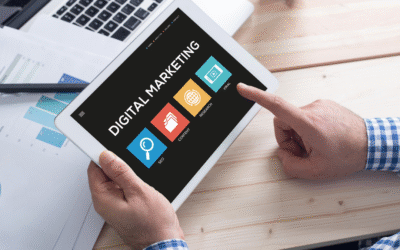It’s important to understand what digital marketing truly encompasses as we navigate an increasingly online world. In essence, digital marketing refers to a variety of strategies and techniques used to promote products or services through digital channels, including search engines, social media, email, and websites. I will guide you through the key components of digital marketing, helping you grasp how these tools can enhance your brand’s visibility and engagement with your audience in today’s digital landscape.
Definition of Digital Marketing
A digital marketing strategy involves the use of digital channels such as search engines, social media, email, and websites to connect with your audience. In my experience, it’s all about promoting products or services through online platforms, aiming to reach consumers where they spend a significant amount of their time. This multi-faceted approach not only enhances visibility but also enables businesses to engage with their audience in real time. Ultimately, digital marketing is about creating meaningful relationships and driving measurable results in the digital landscape.
Key Components of Digital Marketing
Your journey into digital marketing involves understanding its key components, which encompass various strategies aimed at reaching and engaging target audiences effectively. These elements work synergistically to build brand awareness, drive traffic, and increase conversions in the ever-evolving digital landscape.
Search Engine Optimization (SEO)
Along with improving website visibility, Search Engine Optimization (SEO) focuses on optimizing content to rank higher in search engine results. This process involves keyword research, on-page optimization, and building backlinks, all aimed at attracting organic traffic to your website.
Content Marketing
For businesses aiming to connect with their audience, content marketing serves as an effective strategy. By creating valuable, relevant content, you engage potential customers, establish authority, and foster relationships that can lead to conversions.
Also, content marketing encompasses various formats, such as blog posts, videos, podcasts, and infographics. The key is to deliver consistent, high-quality content that addresses your audience’s needs and interests, thereby positioning your brand as a trusted resource and driving customer loyalty.
Social Media Marketing
Behind every successful brand, there is a strong social media presence. Social media marketing involves promoting content across platforms like Facebook, Instagram, and Twitter to engage users, promote products or services, and build a community around your brand.
Another vital aspect of social media marketing is its ability to facilitate two-way communication between you and your audience. By interacting with followers, addressing their concerns, and sharing user-generated content, I can foster deeper connections and enhance brand loyalty, ultimately driving more conversions.
Email Marketing
On the digital marketing spectrum, email marketing remains one of the most effective ways to reach your audience. By sending targeted campaigns directly to users’ inboxes, I can communicate personalized messages that promote products, share updates, and engage customers.
With email marketing, segmentation plays a significant role in increasing engagement rates. By tailoring content to specific audience segments based on their interests and behaviors, I can maximize the impact of each campaign, ensuring that my messages resonate with recipients and drive action.
Pay-Per-Click Advertising (PPC)
Between the various digital marketing strategies, Pay-Per-Click (PPC) advertising offers a cost-effective method to drive traffic to your website. With PPC, you pay only when someone clicks on your ad, making it a highly targeted approach to reach potential customers.
Hence, PPC advertising allows me to specify my audience through targeted keywords, locations, and demographics. This precision not only improves my ROI but also provides valuable data for optimizing future campaigns, ensuring I continually reach the right users with the right message at the right time.
Benefits of Digital Marketing
Not only does digital marketing provide an affordable way to reach a global audience, but it also offers measurable results. You can track your campaigns in real-time, making it easier to identify what works and what doesn’t. This adaptability ensures resources are used efficiently, enhancing your return on investment. Additionally, digital marketing allows for targeted campaigns, meaning you can connect with specific demographics that align with your business goals. It empowers you to engage with your audience interactively, fostering relationships that can lead to customer loyalty.
Digital Marketing Strategies
Now, I can say that crafting effective digital marketing strategies requires an understanding of your target audience and the various channels available. Whether it’s through social media, email marketing, or search engine optimization, identifying the right mix of tactics allows you to engage your customers meaningfully. Tailoring your approach based on analytics and consumer behavior can lead to increased brand awareness, loyalty, and ultimately, conversions.
Inbound Marketing vs. Outbound Marketing
Any effective digital marketing strategy should consider the differences between inbound and outbound marketing. Inbound marketing focuses on attracting customers through valuable content and engaging experiences that address their needs and interests. In contrast, outbound marketing relies on traditional promotional methods, such as ads and cold calls, to reach a broader audience. Understanding these distinctions helps you choose the best approach for your brand.
Data-Driven Marketing
Around 70% of consumers expect a personalized experience from brands. This expectation underlines the importance of data-driven marketing, which involves leveraging analytics and insights to inform your marketing strategies. By examining customer behavior, preferences, and trends, you can make real-time adjustments to your campaigns, improving effectiveness and customer satisfaction.
Hence, data-driven marketing empowers you to focus on specific audience segments, optimize your messaging, and enhance overall return on investment. By utilizing tools and analytics platforms, you can track metrics such as engagement rates, conversion rates, and customer journey patterns. This approach not only grants you a clearer understanding of your audience but also allows for more strategic decision-making, leading to better outcomes in your digital marketing efforts.
Challenges in Digital Marketing
To navigate the ever-evolving landscape of digital marketing, you will encounter several challenges that can impact your strategy. I often find that keeping up with the rapid changes in algorithms and platforms requires constant adaptation. Furthermore, standing out in a saturated market can be difficult—I understand that your message must resonate deeply with your audience. Additionally, measuring the effectiveness of various campaigns can sometimes be confusing, making it necessary for you to analyze data accurately. These challenges, while daunting, are opportunities for growth and innovation in your marketing efforts.
Future Trends in Digital Marketing
For anyone engaged in digital marketing, understanding future trends is crucial for staying competitive. I see a shift towards hyper-personalization, where data-driven insights will allow you to create tailored experiences for your audience. Additionally, the rise of artificial intelligence in content creation and customer interaction will redefine how you engage with consumers. Voice search and visual search are also gaining momentum, so optimizing your strategies accordingly will be vital. As I navigate these changes, I encourage you to remain adaptable and innovative to seize the opportunities ahead in the digital landscape.
Conclusion
Conclusively, digital marketing encompasses a variety of online strategies and platforms designed to engage and convert your target audience. I believe it is imperative for you to understand how to utilize tools like social media, SEO, and email campaigns to enhance your brand’s visibility and reach. By mastering these elements, you can effectively connect with your audience in the digital landscape, ultimately driving growth and success for your business.









